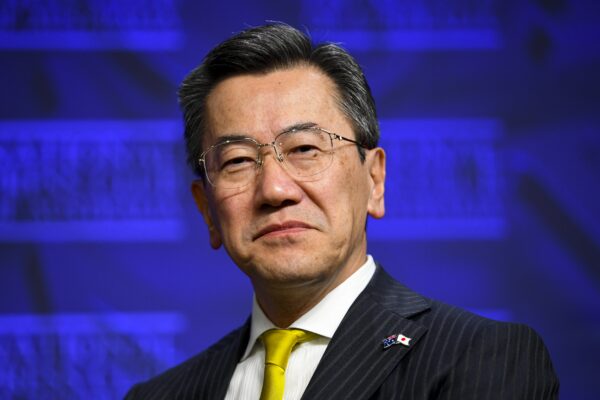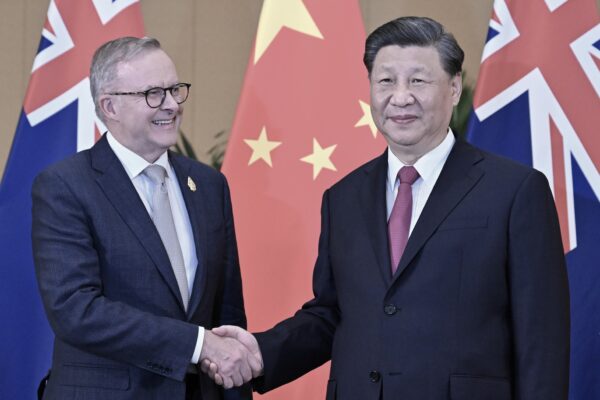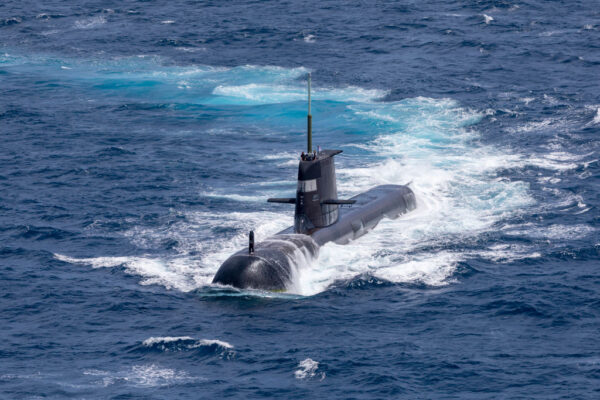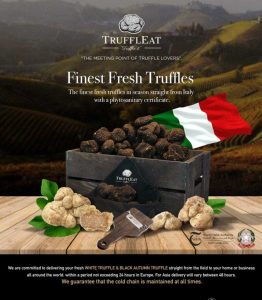Beijing’s top envoy to Australia has attempted to drive a wedge into Australia’s growing ties with Japan by criticising his Japanese counterpart in Canberra and warning Australians against trusting their former World War Two enemy lest Japan launch another military attack on the country in the future.
Chinese ambassador Xiao Qian made the comments during a New Year press conference at the Chinese Embassy in Canberra on Jan. 10.
Targeting Japanese ambassador to Australia, Shingo Yamagami, who in an op-ed for the Australian has said both Australia and Japan need to be “vigilant” towards China, citing Beijing’s threats of retaliation against countries that imposed COVID-19 tests on Chinese arrivals, Xiao accused the ambassador of not doing his job.
He also raised the Japanese attack on Darwin and the treatment of Australian POW’s held by Japanese forces in the Pacific, saying that Japan had never apologised for its behaviour in the war. He also accused Japan of not accepting its wrong behaviour and said, “they might repeat the history.”
Japan launched nearly 100 air raids on Australia during the Second World War, including attacks on Darwin and Broome, and invaded the Australian-controlled territories of New Guinea and Papua.
However, in 1957, after Japan surrendered unconditionally at the end of the war, then-Japanese prime minister Nobusuke Kishi during a visit to Australia, did offer atonement for the country’s wartime actions, expressing his country’s sorrow for what happened during the war.
“It is my official duty, and my personal desire, to express to you and through you to the people of Australia our heartfelt sorrow for what occurred in the war,” Kishi said.

Japan Now Peace-Loving and Rule Abiding
In response to Xiao comments Yamagami said that everyone knew Japan is a peace-loving, rules-abiding country, and what took place over 80 years ago should not be an issue.
“We all know how many years have passed since the end of World War II. We all know the post-war trajectory of peace-loving, rules-abiding Japan,” he told ABC TV. “So what’s at issue here is not what took place more than eight decades ago. What’s at issue here is how to deal with coercion and intimidation throughout the region.”
“And here Australia and Japan are in total sync.”
Japan is now considered a strategic ally of Australia, alongside India and the United States, being members of the Quadrilateral Security Dialogue (Quad) partnership.
The Japanese ambassador said his remarks on China were just “common sense.”
“We place significant emphasis on the importance of maintaining [the] rules-based international order. If that offends my Chinese counterpart, what can I say?”
Prime Minister Anthony Albanese was asked about Xiao’s comments on Japan.
“We have a very positive relationship with Japan,” Albanese told a journalist on Jan. 11.
“With China, we also want to see an improvement in relations. I believe that the ambassador’s comments were positive and constructive about those issues,” he said.

“I look forward to continuing to build on that constructive dialogue, I want to cooperate with China where we can, we will disagree where we must, but will engage in our national interest.”
AUKUS Criticized for Targeting China
Xiao also attacked the AUKUS security pact between Australia, the United Kingdom, and the United States, saying it was not “constructive” or “helpful.” He also said it targeted “China as a potential threat or adversary.”
“China is not seeking to be an enemy with the United States, neither are we of the United Kingdom, nor are we of Australia, so there’s no reason for the three countries to stand together to work on something that’s targeting China as a threat,” Xiao said.
On the contrary, Defence Minister and Deputy Prime Minister Richard Marles praised AUKUS last month as a “shared mission between our three countries to work together to pursue advanced military capability”.
“At a time where the strategic circumstances faced by the world are as complex and precarious as we’ve seen since the end of the Second World War, [it is] central that Australia being able to acquire a nuclear-powered, highly capable submarine,” he said during the opening of AUKUS Defence Ministers’ meeting in December 2022.

Former Liberal senator for Tasmania Eric Abetz echoed Marles’ viewpoint.
“The nuclear submarine acquisition under the AUKUS treaty is overwhelmingly considered a vital recalibration of Australia’s defence posture,” Abetz wrote in an opinion piece to The Epoch Times.
Ambassador Attempts Positive Note on Trade and Detained Australians
In a symbolic gesture Xiao toasted the audience with a glass of Australian wine, which has been banned from being exported to China after former Prime Minister Scott Morrison called for an inquiry into the origins of COVID-19, saying that the bilateral relationship with Australia was “at a critical stage of turnaround.”
“I would hope that as we are improving relations that you have more encouragement to the Chinese economy, to the Chinese customers to come back for a stronger appetite for Australian products,” he said.
However, the Chinese government has yet to remove the punitive trade tarriffs which they have admitted were an attempt to coerce Australia. Currently, the trade tarriffs still remain in place on Australian wine, beef, honey, lamb, lobster and other exports products according to the Department of Foreign Affairs and Trade.
Amid a thawing in bilateral trade relations after Foreign Minister Penny Wong’s visit of China last month, the ambasador also tried to set a positive tone when asked about detained Australians, journalist Cheng Lei and author Yang Hengjun, saying he hoped a solution would come “as soon as possible.”
But he also noted that Australia needed to respect the Chinese legal system.
Yang Hengjun and Cheng Lei have been detained in China since 2019 and 2020, respectively. In both cases the Australian governemnt has criticised the Chinese regime for lack of transparency and independence of the courts.
Cindy Zhan is a reporter based in Australia. She covers national news with a focus on China-related issues. Got a tip? Contact her at cindy.zhan@epochtimes.com.au


